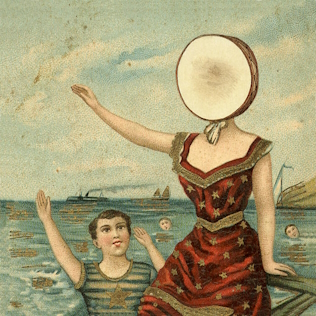In the Aeroplane Over the Sea |
|
Released: February 10, 1998 Peak: -- Sales (in millions): 0.39 US, 0.06 UK, 0.45 world (includes US and UK) Genre: psychedelic rock/new Americana |
Tracks:Song Title (Writers) [time] (date of single release, chart peaks) Click for codes to charts.
Total Running Time: 39:15 The Players:
|
Rating:4.116 out of 5.00 (average of 18 ratings)
Awards:(Click on award to learn more). |
About the Album:Singer/songwriter Jeff Mangum, born in Louisiana in 1970, formed Neutral Milk Hotel in 1989. The “group” started when Mangum was in high school as a home recording project that was deliberately low-fi, combining psychedelic folk and indie rock. He started working with friends and fellow musicians Robert Schneider, Bill Doss, and Will Cullen Hart. In 1996, he and Schneider recorded the album On Avery Island. Mangum then recruited Jeremy Barnes, Julian Koster, and Scott Spillane to tour with. The four of them went to Denver, where Schneider lived, to record a new album, In the Aeroplane Over the Sea, based on demos written by Mangum. It was produced by Schneider. Musically, Aeroplane combined more traditional rock instruments like guitar and drums with less conventional instruments like the singing saw and uilleann pipes. WK “Mangum’s distorted acoustic guitar rattles and shakes under grandiose instrumental arrangements of accordion, organ, brass and banjo. The faint warble of singing saw dances across the tracks, elevating the sound to mystical heights. Its peculiarities expand the scope of the album, creating a novel vaudeville-esque sound that exudes a refreshing whimsy and sentimentality.” PM Mangum has said he was heavily influenced by The Diary of a Young Girl, a real-life account from teenager Anne Frank of her time during Nazi occupation during World War II before dying in a concentration camp. Mangum said he spent “about three days crying” and dreamed of traveling back in time to save her. WK Tracks such as Holland, 1945 and Ghost incorporate elements of her life into the lyrics. WK “The exploration of Mangum’s vibrant youth within the context of historical sorrow unveiled a newfound emotional space for Mangum rife with joy and anguish.” PM The album integrates themes of “neurotic observation [and] sexual awakening” PM as it “voyages through adolescence without flinching and unveiling some bittersweet truths along the way.” PM “Fans have long argued over the exact meaning of the album.” WK Mark Richardson of Pitchfork said, “It’s like a children’s book or a fairy tale, Where the Wild Things Are, on wax.” WK PopMatters’ P.J. Sauerteig suggested that the album’s central message is about Mangum’s desire to be loved, be it by a love interest or peers or people he idolizes. WK The album attracted a cult following and received praise as a landmark of indie rock, influencing groups like Arcade Fire and the Decemberists. The popularity took its toll on Mangum and he withdrew from touring and the group soon went on hiatus. They have yet to record another album. |
Resources and Related Links:
First posted 6/6/2024. |









No comments:
Post a Comment